
第57章 CHAPTER IX.(1)
From the time of Louis XVI.'s accession to the throne, the Queen had been expecting a visit from her brother, the Emperor Joseph II. That Prince was the constant theme of her discourse. She boasted of his intelligence, his love of occupation, his military knowledge, and the perfect simplicity of his manners. Those about her Majesty ardently wished to see at Versailles a prince so worthy of his rank. At length the coming of Joseph II., under the title of Count Falkenstein, was announced, and the very day on which he would be at Versailles was mentioned. The first embraces between the Queen and her august brother took place in the presence of all the Queen's household. The sight of their emotion was extremely affecting.
The Emperor was at first generally admired in France; learned men, well- informed officers, and celebrated artists appreciated the extent of his information. He made less impression at Court, and very little in the private circle of the King and Queen. His eccentric manners, his frankness, often degenerating into rudeness, and his evidently affected simplicity,--all these characteristics caused him to be looked upon as a prince rather singular than admirable. The Queen spoke to him about the apartment she had prepared for him in the Chateau; the Emperor answered that he would not accept it, and that while travelling he always lodged at a cabaret (that was his very expression); the Queen insisted, and assured him that he should be at perfect liberty, and placed out of the reach of noise. He replied that he knew the Chateau of Versailles was very large, and that so many scoundrels lived there that he could well find a place; but that his valet de chambre had made up his camp-bed in a lodging-house, and there he would stay.
He dined with the King and Queen, and supped with the whole family. He appeared to take an interest in the young Princesse Elisabeth, then just past childhood, and blooming in all the freshness of that age. An intended marriage between him and this young sister of the King was reported at the time, but I believe it had no foundation in truth.
The table was still served by women only, when the Queen dined in private with the King, the royal family, or crowned heads.
[The custom was, even supposing dinner to have commenced, if a princess of the blood arrived, and she was asked to sit down at the Queen's table, the comptrollers and gentlemen-in-waiting came immediately to attend, and the Queen's women withdrew. These had succeeded the maids of honour in several parts of their service, and had preserved some of their privileges. One day the Duchesse d'Orleans arrived at Fontainebleau, at the Queen's dinner-hour. The Queen invited her to the table, and herself motioned to her women to leave the room, and let the men take their places. Her Majesty said she was resolved to continue a privilege which kept places of that description most honourable, and render them suitable for ladies of nobility without fortune. Madame de Misery, Baronne de Biache, the Queen's first lady of the chamber, to whom I was made reversioner, was a daughter of M. le Comte de Chemant, and her grandmother was a Montmorency. M. le Prince de Tingry, in the presence of the Queen, used to call her cousin. The ancient household of the Kings of France had prerogatives acknowledged in the state. Many of the offices were tenable only by those of noble blood, and were sold at from 40,000 to 300,000 franca. A collection of edicts of the Kings in favour of the prerogatives and right of precedence of the persons holding office in the royal household is still in existence.]
I was present at the Queen's dinner almost every day. The Emperor would talk much and fluently; he expressed himself in French with facility, and the singularity, of his expressions added a zest to his conversation. I have often heard him say that he liked spectacculous objects, when he meant to express such things as formed a show, or a scene worthy of interest. He disguised none of his prejudices against the etiquette and customs of the Court of France; and even in the presence of the King made them the subject of his sarcasms. The King smiled, but never made any answer; the Queen appeared pained. The Emperor frequently terminated his observations upon the objects in Paris which he had admired by reproaching the King for suffering himself to remain in ignorance of them. He could not conceive how such a wealth of pictures should remain shut up in the dust of immense stores; and told him one day that but for the practice of placing some of them in the apartments of Versailles he would not know even the principal chef d'oeuvres that he possessed.
[The Emperor loudly censured the existing practice of allowing shopkeepers to erect shops near the outward walls of all the palaces, and even to establish something like a fair in the galleries of Versailles and Fontainebleau, and even upon the landings of the staircases.]
He also reproached him for not having visited the Hotel des Invalides nor the Ecole Militaire; and even went so far as to tell him before us that he ought not only to know what Paris contained, but to travel in France, and reside a few days in each of his large towns.